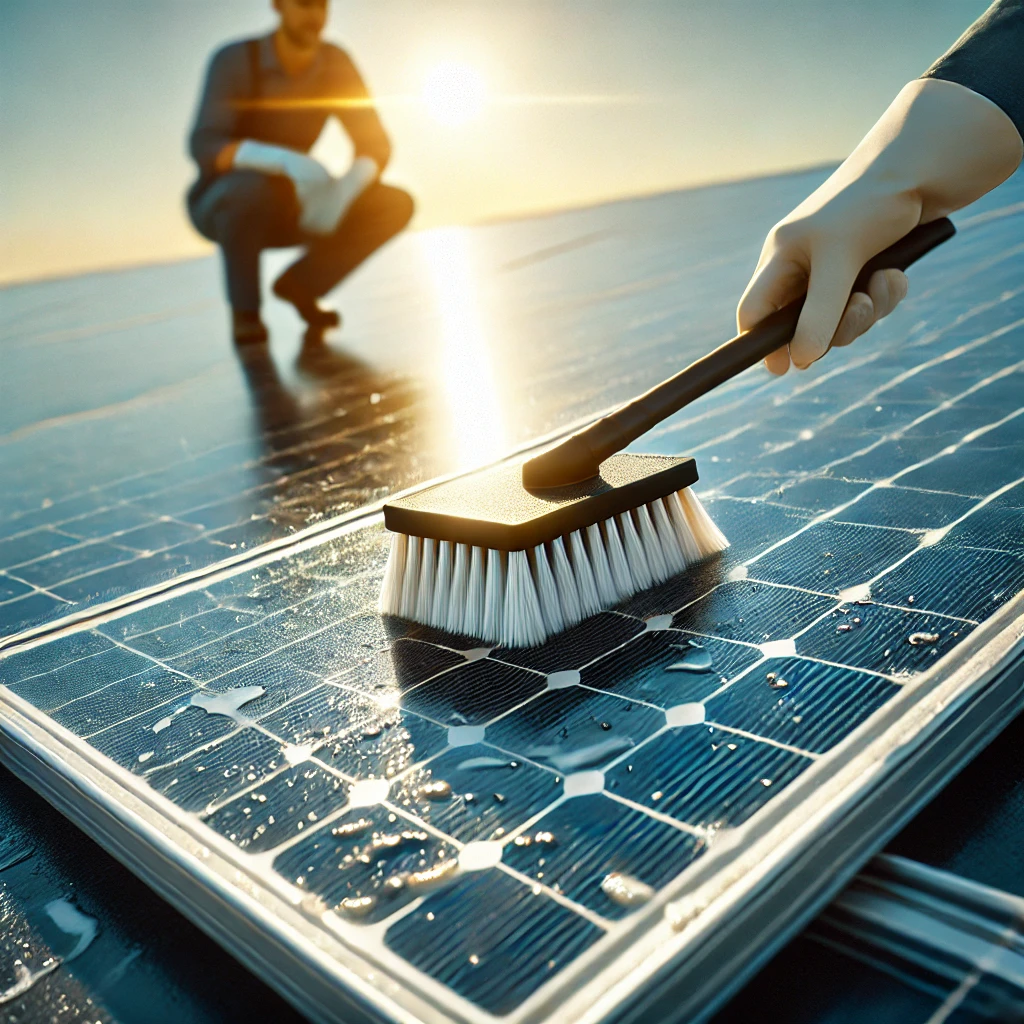
As a homeowner with solar panels, you’re already making an environmentally and financially smart choice by harnessing the power of the sun. But one question that often comes up is, do solar panels need to be cleaned? The simple answer is yes, but there’s more to the story. In this blog, we’ll explore why cleaning your solar panels is important, how often you should clean them, and the best practices for keeping your panels working efficiently.
Why Do Solar Panels Need to Be Cleaned?
Solar panels are exposed to the elements 24/7, meaning they can accumulate dust, dirt, pollen, bird droppings, leaves, and even snow. While most solar panels are designed to be low-maintenance and are angled to let rain naturally wash away some debris, certain build-ups can reduce their efficiency over time. Here’s why keeping them clean is important:
1. Maximizing Efficiency
Dirt and debris can block sunlight from reaching the solar cells, reducing the amount of energy your panels can generate. Even a thin layer of dust or grime can lower energy production by 5-20%, depending on the severity. Regular cleaning ensures your panels are operating at peak efficiency, allowing you to get the most out of your solar investment.
2. Enhancing Longevity
Keeping your panels clean can help ensure they last longer. Dirt and grime can wear down the surface of the panels over time, especially if left unattended. Regular cleaning helps preserve the panels’ protective coating, ensuring they function optimally for their entire lifespan.
3. Improving ROI
The more efficiently your panels work, the more energy they produce, which in turn increases your return on investment (ROI). The small effort or cost of cleaning your panels can be offset by the savings you generate through improved performance.
How Often Should Solar Panels Be Cleaned?
The frequency of cleaning depends on several factors, including your location, the environment around your home, and how much debris accumulates on your panels. Here are some general guidelines:
1. Geographical Location
If you live in an area with frequent rain, nature may do most of the cleaning for you. However, in dry, dusty climates like the Southwest or areas prone to air pollution, panels are likely to accumulate more grime and may need cleaning every few months.
2. Proximity to Trees or High Debris Areas
Homes located near large trees may experience more debris from leaves, pollen, and bird droppings. In these cases, you may need to clean your panels every 3 to 4 months to maintain efficiency.
3. After Major Events
Cleaning is especially important after events like wildfires, dust storms, or heavy pollen seasons, which can leave a layer of grime on your panels. Snow, while temporary, can also block sunlight and reduce panel efficiency until it melts away.
On average, most homeowners find that cleaning their solar panels twice a year is enough to keep them running efficiently.
How to Clean Your Solar Panels Safely
While keeping your solar panels clean is important, it’s equally crucial to ensure they’re cleaned safely to avoid damage or personal injury. Here’s how to do it:
1. Use the Right Tools
You don’t need special equipment to clean your solar panels. A soft brush or sponge, mild soap, and a hose with soft water (if available) are usually all you need. Avoid using abrasive tools, high-pressure water, or harsh chemicals, as these can damage the panels’ surface.
2. Clean on a Cool, Overcast Day
Cleaning panels during the early morning, late afternoon, or on a cloudy day is ideal. Solar panels can get very hot in direct sunlight, and spraying cold water on hot panels could crack the glass. Plus, cleaning during cooler hours prevents the water from evaporating too quickly, giving you more time to wash away debris.
3. Consider Professional Cleaning
If your panels are hard to reach, or if you’re uncomfortable with heights, you might want to hire a professional cleaning service. Many companies offer solar panel cleaning services, and while there’s a cost involved, it’s often worth it to ensure the job is done safely and effectively.
4. Use Automated Cleaning Solutions
If you live in a particularly dusty or debris-prone area, you might consider investing in an automated cleaning system. These systems are often used in commercial solar farms but can also be installed for residential use. They use water and brushes to keep your panels clean without requiring manual intervention.
Will Rain Clean My Solar Panels?
Many homeowners wonder if rain is enough to clean solar panels. While rain does help wash away light dust, it’s not a substitute for regular cleaning. Just like how rain doesn’t fully clean your car, it won’t completely remove the stubborn grime, bird droppings, or sticky pollen that can accumulate on your panels. In fact, rain can sometimes leave water spots or streaks, which can further reduce panel efficiency.
Conclusion: Keep Your Panels Clean for Maximum Efficiency
While solar panels are generally low-maintenance, regular cleaning is necessary to ensure they operate at peak efficiency. By keeping your panels free from dirt, debris, and other obstructions, you’ll maximize energy production, increase your system’s lifespan, and improve your overall return on investment. For most homeowners, cleaning solar panels twice a year is sufficient, but those in dustier or debris-heavy areas may need more frequent maintenance.
If you’re unsure about when or how to clean your panels, or if you’d rather leave it to the experts, contact us at The Solar Broker. We can help you maintain your solar system so it continues delivering top-notch performance for years to come.